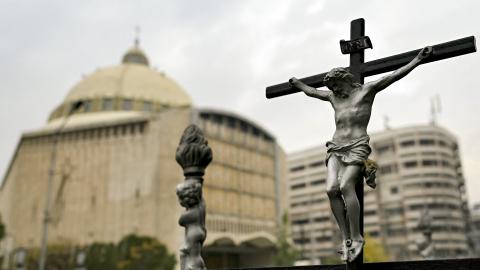The “sun of freedom has risen over Syria today,” declared Bishop Hanna Jallouf, head of Syria’s Latin Church, when recently asked about the country’s new ruler, the Islamist terror group Hayat Tahrir al-Sham or HTS. He said guarantees were received that “our churches and properties would remain untouched”. The bishop, along with other Syrian church leaders, are whistling past the graveyard.
All of Syria’s churches, whether of the larger Orthodox community or Catholic, are facing an imminent existential threat both from the new authorities and general political chaos following the Assad regime’s collapse. In a December 9 email, Archimandrite Emanuel Youkhana, a priest of the ancient Assyrian Church of the East, who administers aid in Kurdistan with the help of the New York-based pontifical CNEWA, frankly stated: Syrian Christians’ fears are “pronounced and serious”.
Over the last 13 years, this Christian community saw jihadis systematically burn and desecrate their ancient churches, kill two beloved bishops and other clerics, subjugate and enslave women, take hostage entire Khabour Valley villages, and slaughter those who didn’t conform. Such brutality stemmed from the fanatical religious hatred nurtured by these same jihadi militants, whether called al Qaeda, ISIS or HTS. Christians are acutely aware that the militia now running their country is a terrorist group (designated as such by the US, UK and UN).
That commander Al-Jolani has now changed into a Western suit and talks of moderation, they undoubtedly see, is purely tactical. When before has a holy warrior, at the very moment of triumph, pulled down his keffiyeh to reveal underneath a champion of religious pluralism and freedom? These militants are no more credible than the Taliban, who promised to respect women’s rights but who, three years after taking control of Afghanistan, have “erased” women from public life, as the UN reports.
Church leaders are ideologically committed to keeping their flocks in the land where the New Testament first applied the term “Christian” and, yet, without militias of their own, they are utterly vulnerable. I’ve learnt that church leaders’ silence or even public praise concerning a specific tyrannical regime often occurs in inverse proportion to their fears of persecution.
A short while ago, Syrian Church leaders had insisted that Bashar Assad was not the reputed monster of vast dungeons and chemical weapon attacks, but was the “protector” of religious minorities. Assad proved not very helpful to them during the violent “Arab Spring”, civil war, or the period of ISIS’ caliphate and its infamous female slave markets in Raqqa. Since 2010, Syria’s Christian community has plunged by 90 per cent, from two million, to 250,000 today, with most fleeing to the West.
Furthermore, Father Jihad Youssef, superior of Syria’s 6th century Mar Musa monastery, recently told Catholic media that Christians all along have, as a matter of Syrian law, been denied equal rights. He explained:
The traditional attitude of Muslims towards Eastern Christians has oscillated between cruel and humiliating closure and persecution and moderate or even welcoming openness, sometimes for a short time, but always within the framework of the concept of Ahl al-Dhimmah. According to Syrian laws currently in force (before freedom), Christians are second class citizens in crucial areas. This is the reality.
We should remember that Syria’s Christians are now hostages of a new repressive regime and should not take at face value their leadership’s optimistic statements. Father Benedict Kiely, founder of Nasarean.org, which aids Christian micro businesses in the region, told me that he sees this as a “dangerous moment” for the Syrian Church. John Pontifex with the pontifical Aid to the Church in Need warns that religious freedom violations often “worsen after the fall of a long-standing regime”.
Archimandrite Youkhana elaborated: “The militias now in control are predominantly radical Islamic jihadist groups … who are diverse in ideologies and organisations. There is no guarantee they will remain unified… On the contrary, they are likely to engage in conflicts and fights over influence and control.” Noting that Turkish “management of recent events are evident and well-known,” he raises another concern: “[I]n which direction will Turkey push the situation?” Turkey’s Christian genocide survivors had found refuge in Syria and the community generally fears Istanbul’s intentions.
Another reason for scepticism about HTS’ hopeful promises comes from MEMRI, the American non-profit research and translation group. While HTS publicly claims to be focused on Syria’s pressing national issues, it privately reasserts jihadi goals of greater conquest. On December 8, MEMRI taped HTS militants in Damascus proclaiming: “We will enter the al-Aqsa Mosque in Jerusalem, the Prophet’s Mosque in Medina, and the Kaaba in Mecca. Just like we entered the Umayyad Mosque in Damascus.”
The Israel Defense Forces and US Central Command aren’t taking any chances. They directed airstrikes against Syrian ISIS encampments, chemical and other weapon sites, and military infrastructure.
After two millennia, Syria’s ancient but dwindling Christian community is facing dire peril. Desperate to continue the church’s presence in this Cradle of Christianity, Syria’s Christians plead for our prayers and help.
Enjoyed this article? Subscribe to Hudson’s newsletters to stay up to date with our latest content.















